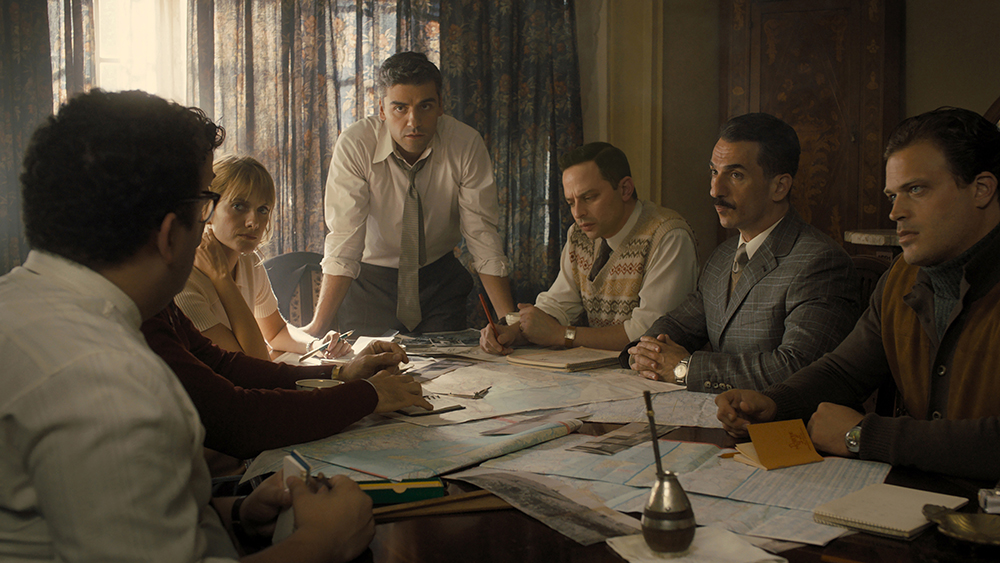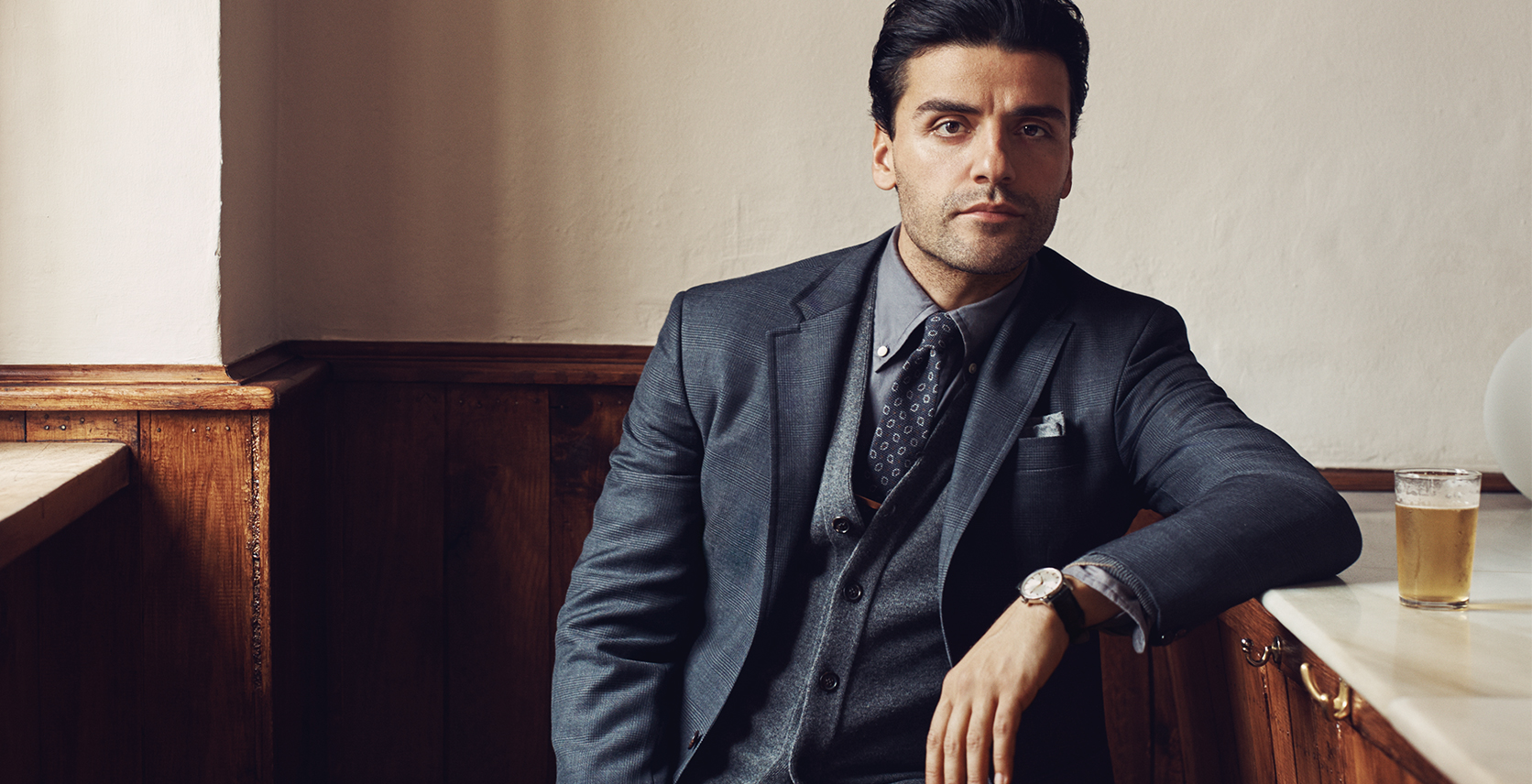The Healing Powers of Oscar Isaac
It’s hard to say whether it’s the sort of exercise a bereavement counsellor would recommend: come to grips with the recent loss of your mother by taking on the role of a movie character processing the ultimate heartbreak. Throw in Annette Bening playing a psychologist to accompany you through a series of therapy scenes requiring a great deal of scripted crying, and action!
For Oscar Isaac, it initially just felt like awful timing. “My mom passed away last February, and I started shooting Life Itself that March,” he says. “At that point, I didn’t know up from down. I had said yes to the script before I even knew she was really ill, and up until right before shooting, I had been contemplating a way to weasel out of it. But [showing up to set] ended up being the best decision I could have made.”
Timing is a major theme in Life Itself, premiering this September at the Toronto International Film Festival. The movie is a sprawling epic that jumps backwards and forwards as it retraces the rises and falls of several romances — as though each of its characters is delivering their own personal response to that Talking Heads lyric, “Well, how did I get here?” Their answers outline the way that boozy Halloween parties and long bus rides and bad concerts can prove unexpectedly pivotal to the trajectory of one’s narrative.
The film is written and directed by Dan Fogelman, the This Is Us television showrunner who is a master at making both his actors and his audience ugly cry for an hour each Tuesday night. This past February, Fogelman deployed a faulty instant pot as a plot device to kill America’s favourite TV dad, Jack Pearson, in an especially emotional episode that aired after the Super Bowl. Granted, his storytelling depicts not only the difficulty of carrying on after great loss, but also the heartening ways that the people able to do so are eventually rewarded.
It was the honesty of that storytelling that Isaac — tasked with portraying devastating anguish while dealing with plenty of his own — connected to. “I like Dan so much,” he says. “So when he reached out with this thing that was both very funny and incredibly tragic in equal doses, I knew I wanted to be a part of it. I did get nervous that it was coming during such a difficult time in my life. Emotionally, I was just completely spent. But the process of doing that material was so cathartic and fun — at a time in my life when I really didn’t think having fun was possible.”

Slowly but surely, Isaac felt a release. So, after wrapping a film that required him to confront grief head-on, the actor launched into something light: a six-week stage production of Hamlet performed at New York’s Public Theater. “Hamlet, again, is all about grief,” he acknowledges. “He is someone who doesn’t think it’s fair of himself to move on. Everyone is telling him to, but it just doesn’t feel right. In some ways, I’m still in that state. And yet it really comes down to one thing or another: you either also die, or you keep living. I’m pretty sure I know which one my mom would have wanted me to do.”
To be, or not to be. For Isaac, there was a clarifying power gained from playing a pair of characters forced to grapple so directly with that question. And the fact that those roles came at a time in his life when he needed reassurance about nothing less than life itself was, well, meant to be.
•••
The actor has felt the power of predetermination before. “I see the world as making you feel like you have unlimited choice, but actually, when you look back, the choice you made is always really the only one you could have made,” he says. How else to explain how Isaac — a doctor’s son who spent his early twenties working as an orderly, wheeling the recently deceased to the mortuary at his dad’s hospital — came to star in this year’s ultimate meditation on loss? Sure, some credit goes to his natural talent, the Juilliard education he eventually picked up, and the early acclaim he garnered in theatre. But the rest goes to fate.
Take his big break at age 34, for instance. That it would be 2013’s Inside Llewyn Davis — a Coen brothers film about a folk musician struggling to find the recognition he deserves — that led to Isaac’s overdue inauguration onto Hollywood’s A-list reflects providence at play in all kinds of ways.
For one thing, there had been a Coen brothers movie poster (Miller’s Crossing) hanging in Isaac’s bedroom back when he was a kid. It also just so happens that the actor had only really started pouring himself into acoustic guitar playing in the months leading up to his audition for that role — aimlessly at first, but almost as if he was anticipating something. “I had been doing all of these open mics for a year and a half,” he says. “So when that audition came along and I needed to play a song, I was ready for it. I could never have expected that. And that was the thing that allowed for so many opportunities.”
It had been a hard-fought journey up until that point — one that received a jump-start when the half-Guatemalan, half-Cuban Isaac, né Oscar Isaac Hernández Estrada, made a name change during his early acting days in Miami, back when he was earning cash as an orderly and most of his callbacks were for frustrating roles like “Latino gangster.” “I love the idea that as an actor you can transform yourself to be anything. Miami is so vibrant with Latino people from all walks of life and all skin colours, and yet I felt so boxed in [by casting directors]. I feel like someone named Oscar Hernández should have just as much of a chance to get my parts as someone named Oscar Isaac. But I am seeing that there has been progress there — more in terms of how much talk there is now about representation, and who gets the right to play what,” he says.
“The world makes you feel like you have unlimited choice, but when you look back, the choice you made is always really the only one you could have made.”
After making a proper splash in Inside Llewyn Davis — Golden Globe nomination and all — Isaac quickly set to work building out a resumé that has packed an entire career’s worth of roles-of-a-lifetime into a half-decade. First there was the edgy indie cult hit Ex Machina, a timely meditation on artificial intelligence. Then there was the prestige television program, HBO’s 2015 political drama Show Me a Hero, which earned him his second Golden Globe nomination and first win. And lately, there have been bona fide blockbusters — X-Men: Apocalypse, followed by two (soon to be three) Star Wars films.
Imagine if he’d taken up pottery instead of open-mic nights.
•••
Isaac’s prolific streak shows no sign of ending anytime soon. Life Itself isn’t even the only film he’s starring in this fall: he also plays the lead in Operation Finale, which retells the real-life story of Israel’s 1960 capture of Adolf Eichmann, then one of the few surviving forces behind the Holocaust.
Isaac steps into the role of the operation’s roguish leader, Peter Malkin, a Mossad secret intelligence agent haunted by the Nazis’ murder of his sister. As a historical thriller, the film mixes entertainment with education, and Isaac says its script served as his first introduction to Eichmann’s war crimes trial. Drawing together testimonials from hundreds of Holocaust survivors, the internationally televised event allowed many to finally articulate their deep sorrow.
“There was this dark shroud over everything — to the point where a lot of people didn’t really even want to talk about it,” he says. “And yet there was this wound there, this festering wound that needed to heal, and part of that was rooted in there still being injustice for what had happened. In a way, the capture of Eichmann really allowed for conversations to start taking place and for healing to happen.”
As heavy as that sounds, the film, like Life Itself, is not without its moments of levity. Isaac says it was his commitment to an honest portrayal of Malkin that led to him delivering such a charismatic performance. “The first time I read the script, Malkin was portrayed as quite a dour, dark, tortured person. But as I read his book [Eichmann in My Hands, a 1990 autobiography], I realized that the guy had an extraordinary sense of humour. The way that he would speak, it wasn’t even so much that he cared about defending Israel. He wanted adventure, and this was a perfect job opportunity for him. Of course, underneath it all, he also had this very personal, individual pain from his family having been killed in the Holocaust.”

That combination of character traits — charming bravado and raw vulnerability — cuts to the heart of what Isaac looks for in his roles. “I generally like to find opposites,” he says. “If I read a script and it’s funny, I try to find the drama. Or if it’s serious, I try to find the lightness in it. There’s always an inner tension, and that’s what’s so interesting. I’m drawn to someone who feels so bad that they have to tell jokes to make themselves feel better.”
•••
Midway through 2017, his year of so much grief, Oscar Isaac also got married and welcomed his first son, Eugene, named after his late mother, Eugenia. He says he’s coming down from recent milestones both good and bad in his own way: by playing guitar. When pressed if he’s still playing any open-mic nights, he admits he’s not — his next gig is actually a benefit show raising money for the victims of a recent volcano eruption in Guatemala. More than 100 people died and thousands were left homeless. “It’s not really unwinding, but playing music for that feels really good,” he says.
He mentions this quietly. Soon after Isaac struck it big, stories like this about his natural charm and compassion were collected in listicles that crowned him The Internet’s Boyfriend, and he doesn’t exactly seem eager to grow his fan club. And yet, if talking about the Guatemalan volcano eruption might encourage someone reading this to donate to the relief fund, then that would be great, because it’s clearly a cause that means something to him. Because many people’s family members are now no longer with them, and Isaac understands what that feels like.
“I don’t know if there is such a thing as pushing through it,” he says. “Grief shifts, and it evolves into something else. It never leaves you — I will always have that grief in me for the rest of my life — but you do need to not be totally consumed by it.”
Volcanoes erupt and evil rises to power and diseases arrive out of nowhere and take away the people who we care about the most, and Oscar Isaac knows all of this. But as long as he’s onscreen, we have a performer who also knows the importance of balancing all of that grief with reflection, humour, and joy. And what a joy that is to watch.










